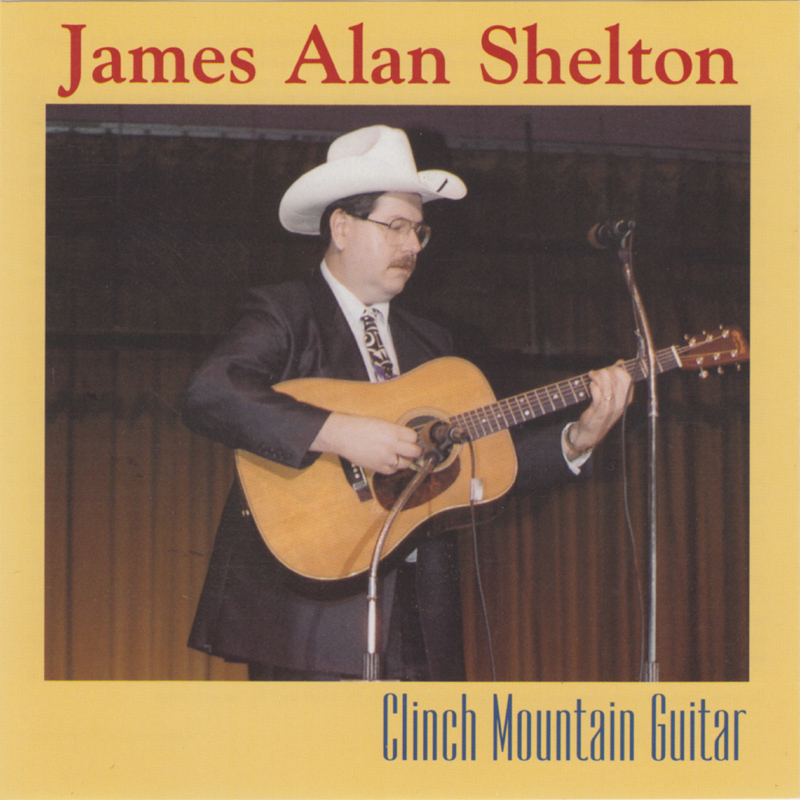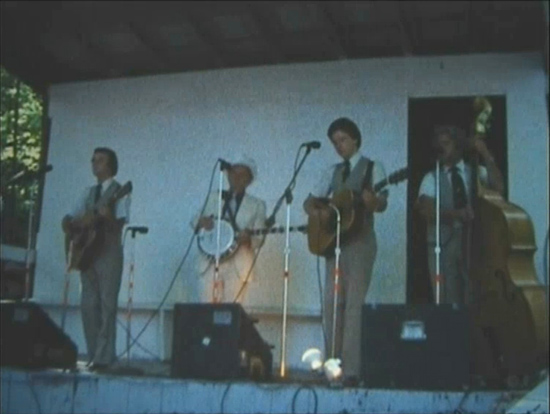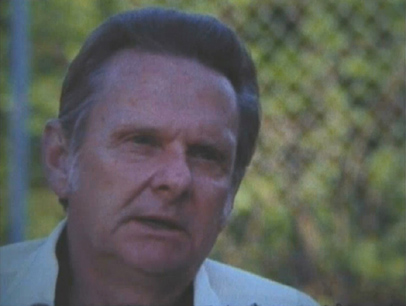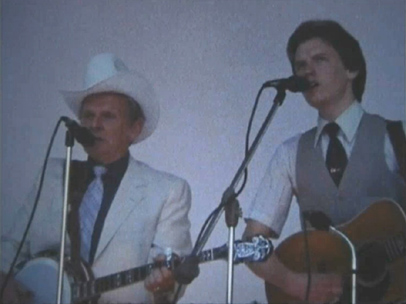- Bill Gatton Chevy Show
- Carter Stanley Interview - 1966
- Jim Kent's film 'Ralph Stanley's Bluegrass Festival'
- New WCYB Recording
- Pound Va. 1972 - Video
- Replica Rebel T-Shirt
- R.I.P. Ralph
- Roy Lee Centers Last Show
- Song & Memory Books
- Stanley Brothers - WCYB Acetate
- Stanley Standard - Carter Stanley Memorial Issue
- Suwannee River Jamboree
- Up In The Cloud - 1957-62
"Ralph Stanley's Bluegrass Festival"
A film by Jim Kent
This is quite a rare find! Back in the early '80s, Jim Kent made a short 14:34 min film of Ralph Stanley's Memorial Festival in McClure, Va. interviewing Ralph and including some footage of the band on the old original 'ampitheatre' stage; along with the festival audience, amateur pickers, and an extract from the Stanley Brother's Feb. 1966 appearance on the Pete Seeger's 'Rainbow Quest' TV show.
Although perhaps superceded today by the Appalshop Ralph Stanley Story video/DVD, and the TNN Life And Times Of Ralph Stanley TV special, this film is still worth a look and represents one of the earliest attempt to document the 'Stanley story' in visual form.
Jim Kent had been a regular at Ralph's festival, even attending the 1st event in 1971 whilst on honeymoon. A decade later, he'd become a professional film-maker, and decided to make a film of the 10th Memorial festival. Unfortunately, the weather that year was terrible, with heavy rain and poor lighting hampering Jim and his crew's efforts, as he explained in 'Bluegrass Unlimited':-
For months I worked with the footage, struggling to make it work, but it was terribly disheartening. There were big holes in the narrative. The things we had filmed, we hadn't shot enough of, or from the right angle. After a while, I shelved the project and stopped thinking about it, but when Memorial Day came around again, and the Eleventh Annual Memorial Bluegrass Festival was pending, my associate and close friend, Sumner Burgwyn rallied me. Unable to draft another crew, the two of us packed away the gear, and trekked down to Ralph Stanley's place for another shot at making a movie.[1]
"Again, we started in the graveyard, determined this time to succeed, and we had a great stroke of luck. While we were shooting at the gravesite, who should approach us but Bill Monroe, come to pay his respects to Carter. The moment captured on film became a center for the film and served as a dramatic highlight in the finished work"
And this time, the God's were smiling down on them...
"The weather was unaccountably temperate, the skies clear and we shot feverishly, trying to capture all those little moments which I felt were necessary. Fortunately, this time we had the gift of hindsight. Having already assembled a rough outline for the film we had only to fill in those holes that existed in the work we had done last year."
"Again, I approached Ralph for an interview... and it was easily accomplished in the shadow of his touring bus. Ralph, a polished performer, seemed comfortable in front of the camera and answered questions easily and naturally, telling his story once more. By hustling, the two of us were able to shoot all day and still set up in time to catch the Stanley afternoon set - each of us running a camera from opposite sides of the stage, to allow the editor a choice of shots and alternate camera angles when assembling the film. Eventually I chose a performance of the A.P. Carter song, 'Will You Miss Me When I'm Gone?' to intercut with the sequence shot earlier at the gravestone, to imply the influence of Carter Stanley."
Once 'in the can' Jim headed back home and began to assemble the footage:-
"The film was finally beginning to take shape, and I was pleased with the way things were going. However, another problem quickly became apparent when I screened my work in progress for people unfamiliar with bluegrass music. They couldn't get a sense for Carter Stanley, or begin to understand the chemistry of the Stanley Brothers through the interviews or montages of still photos and record albums which I had assembled. Without that understanding, much of the emotion and power of the statement was lost. I had for some time been tracking down filmed appearances of the Stanley Brothers, and had located one which had been made early in the spring of 1966, just prior to a European tour which Ralph and Carter made.... After lengthy negotiations... I was allowed at last to use portions of the show in my film to create a segment portraying the excitement of the Stanley Brothers and illustrating the charisma and talent of Carter Stanley."
Once the film was finished, Jim had another stroke of luck:-
"I had managed to catch Ralph and the Clinch Mountain Boys on a northward swing, when they happened to come and play at Harvard University. We took advantage of the opportunity and with the help of the Boston Bluegrass Union, who had sponsored the concert, we had the bands to a buffet luncheon where the film was screened for the first time before the band. Everyone was particularly pleased, and Ralph was moved by the tribute to his late brother, Carter, and sat through the film twice. Backstage, before the concert, Ralph approached me and asked would I consider showing the film for the people at his festival."
"I told him I wouldn't seriously consider missing the event, so I would gladly drag the film along. He was delighted and added the film to the concert schedule to play both Friday and Saturday nights"
"As the film opened, and a rapid fire of Clinch Mountain scenes flashed on the screen, the audience burst into a cheer at the first strains of 'Orange Blossom Special', a song traditonally associated with the Stanley Brothers. That night, on the dark hillside, with bluegrass fans from all over, with Ralph's relatives and neighbors, with bluegrass performers of distinction, the whole struggle became worthwhile. The most remarkable moment came when the old black and white television footage came on and an audible hush fell over the crowd. The strength and power of Carter Stanley came through to all those people who remembered and revered him, as well as to those fans who had never seen the two brothers perform together. And when the sight of Carter Stanley faded from the screen, a spontaneous cheer rose from the audience. The tribute to the fans came at the end, when a montage of viewers tapping their feet and dancing to Ralph Stanley's clawhammer picking of 'Little Liza Jane' and 'Little Birdie' concluded the film. Audience members cheered and howled as they recognized shots of themselves or their friends. Ralph appeared on stage immediately following the screening. 'Did y'all enjoy the film?' The applause and cheers that answered him made my day and (then) he broke into 'Memory Of Your Smile'".
When watching the film I think it's best to keep in mind, that video machines had yet to become a common household item and although the 'Rainbow Quest' was released on video in the early '80s,[2] it's unlikely that the vast majority bluegrass fans would have seen the episode with the Stanley Brothers. So the impact of seeing the Stanleys perform again, must have been something special.
Personally, I'd also have preferred more concert footage than crowd and scenery shots... but I think that kind of misses the point, as Jim seems to have set out to document the overall festival experience, which given the 15min time-limit, it does admirably.[3]
One loose end... There's a couple of sections in the overdubbed audio interview that must have taken from the aborted 10th Memorial festival film, where you can hear the rain hitting the roof of Ralph's RV.[4] This suggests that some of the footage may also possibly have been taken from the 1981 event; i.e. Ralph and the CMB's stage attire is different between the start of film (Orange Blossom Special) and later numbers (Will You Miss Me and the Rocky Island/Little Birdie finale).... This still doesn't explain why you can see Hot Rize's bus though - as they're not on billed any of the 1981-1982 festival adverts... unless they just happened to show up?
Finally - tantalisingly, the adverts for the 1981 - 10th Memorial Festival say in the small print:- "'Clinch Mountain Boys Reunion' on Sunday. Recording a live album of all Stanley songs featuring Art Wooten, Lester Woodie, George Shuffler, Ralph Mayo, Curly Lambert, Al Elliot, Larry Sparks, Melvin Goins, and all of the Clinch Mountain Boys that can attend." This recording was unfortunately never released, and Ralph had to wait until 1996 before there was a Clinch Mountain Boys Reunion album/video... I wonder if the 1981 tapes exist? Were they also hampered by the rain, like Jim's attempt to film that year?
Many thanks to Dennis Schut for digging up this 16mm cine film!
PS: Here's some stills from the film, and associated 'Bluegrass Unlimited' ads etc:-

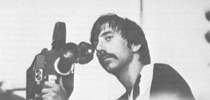
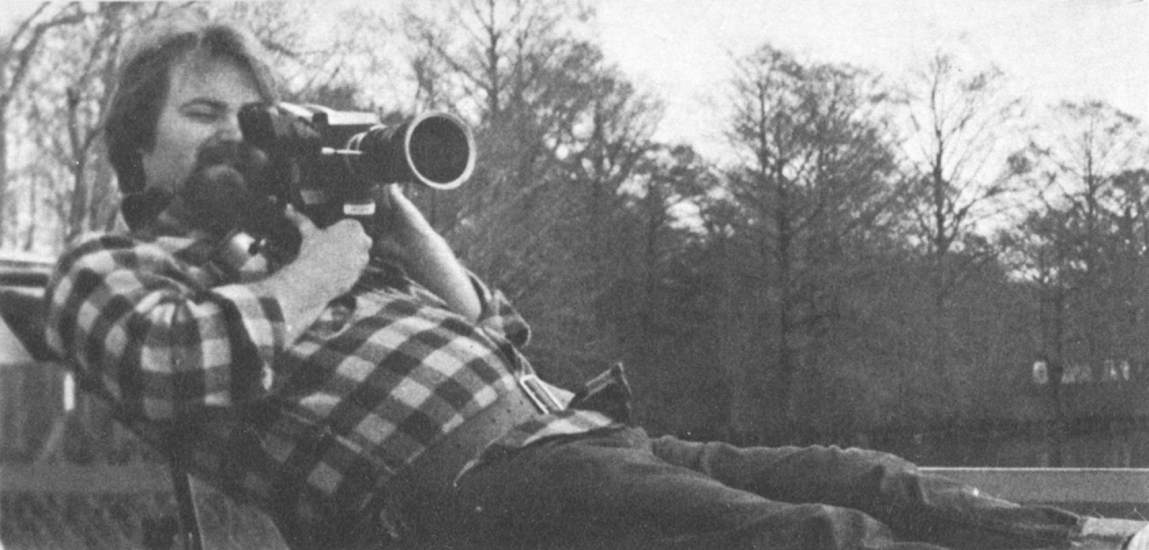
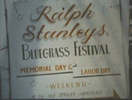
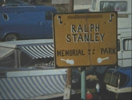
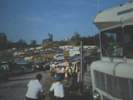
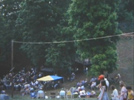
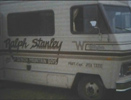
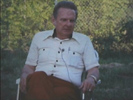
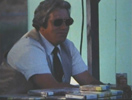
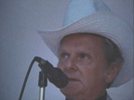
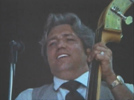
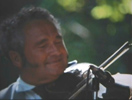
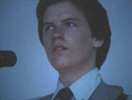
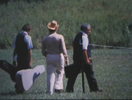



[1] All quotes taken from the 'Bluegrass Unlimited' May 1984 article 'Portrait Of A Film - Ralph Stanley's Bluegrass Festival' by Jim Kent (p. 16-22)
[2] See https://en.wikipedia.org/wiki/Rainbow_Quest.
[3] Lookout for the fleeting glimpse of the Lost Kentuckians...
[4] In the 'Bluegrass Unlimited' article, Jim says about the aborted attempt to film at the 10th Memorial Festival:- "The next day the rains started. Everytime the sky cleared we would haul the equipment out of the car and rush off to shoot while it lasted, but the rains kept up the whole day into the night. From the stage, I could hear the announcer periodically aying 'I think the sky is clearing and the sun is coming out again' to the stalwart audience. It was not to be though, throughout the rest of the weekend we were only able to shoot sporadically. Sitting despondently around the campsite, waiting for the sky to clear, it seemed the right moment to interview Ralph Stanley, who was in his motorhome, resting between performances." and "The interview was entertaining and, occassionally inspiring, but in the midst of our discusson, the rains started again sounding like shrapnel bouncing off the metal roof of the motorhome, and much of the sound was obscured. This meant that in all likelihood I would not be able to use the sound in the film, but I had to plan on an on-camera interview with Ralph for the furure in any case."

